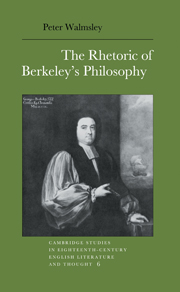Book contents
- Frontmatter
- Contents
- Acknowledgments
- Note to the reader
- Introduction
- PART I THE PRINCIPLES OF HUMAN KNOWLEDGE
- 1 Ideas and the ends of language
- 2 Locke, roles, and passion
- 3 The ends of morality and religion
- 4 Metaphor and the evidence of things not seen
- PART II THREE DIALOGUES BETWEEN HYLAS AND PHILONOUS
- PART III ALCIPHRON
- PART IV SIRIS
- Conclusion
- Select bibliography
- Index
1 - Ideas and the ends of language
Published online by Cambridge University Press: 21 August 2009
- Frontmatter
- Contents
- Acknowledgments
- Note to the reader
- Introduction
- PART I THE PRINCIPLES OF HUMAN KNOWLEDGE
- 1 Ideas and the ends of language
- 2 Locke, roles, and passion
- 3 The ends of morality and religion
- 4 Metaphor and the evidence of things not seen
- PART II THREE DIALOGUES BETWEEN HYLAS AND PHILONOUS
- PART III ALCIPHRON
- PART IV SIRIS
- Conclusion
- Select bibliography
- Index
Summary
Bacon's denunciation of language and its attendant idols of the market became a commonplace in seventeenth-century philosophy. Learned writers repeated his doubts about language's ability to increase our knowledge, and many proposed standards for a new philosophical style. In the Leviathan Hobbes calls for ‘perspicuous words’ to free us from the ‘absurdity’ of our speech, while Locke devotes a whole book of his Essay concerning Human Understanding to a reform of learned language. For Locke, ‘Words, without clear and distinct Ideas’ have to be banished by a careful process of definition in which we keep our simple ideas of sense in view and remind ourselves that words do not stand for things, but ideas of things. Both Locke and Hobbes followed Bacon in rejecting appeals to authority, and both denounced metaphors in philosophical discourse. When writing or speaking the philosopher should keep in mind Locke's three ‘ends of Language’:
First, To make known one Man's Thoughts or Ideas to another. Secondly, To do it with as much ease and quickness, as is possible; and Thirdly, Thereby to convey the Knowledge of Things. Language is either abused, or deficient, when it fails in any of these Three.
In concluding his account ‘Of the Abuse of Words’ in Book III, Locke warns us to shun the arts of language in philosophy:
if we would speak of Things as they are, we must allow, that all the Art of Rhetorick, besides Order and Clearness, all the artificial and figurative application of Words Eloquence hath invented, are for nothing else but to insinuate wrong Ideas, move the Passions, and thereby mislead the Judgment; and so indeed are perfect cheat.
- Type
- Chapter
- Information
- The Rhetoric of Berkeley's Philosophy , pp. 9 - 25Publisher: Cambridge University PressPrint publication year: 1990



